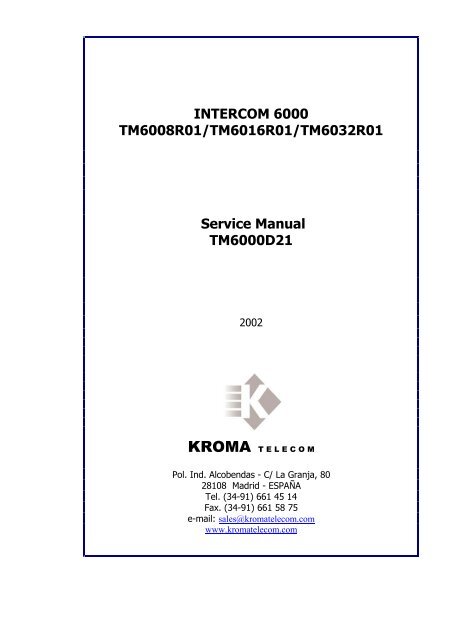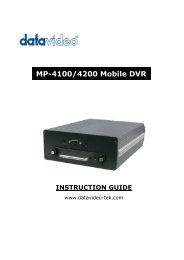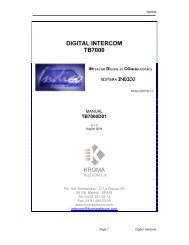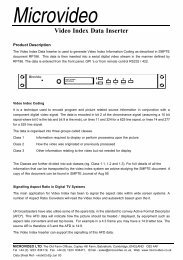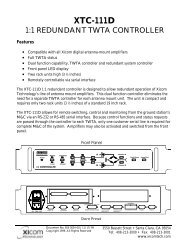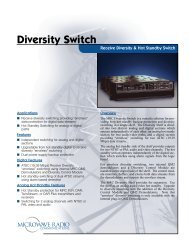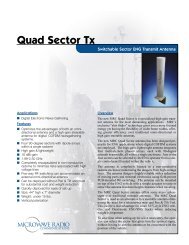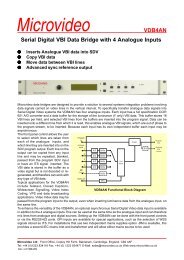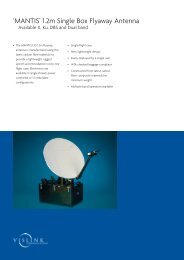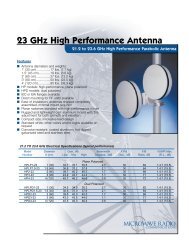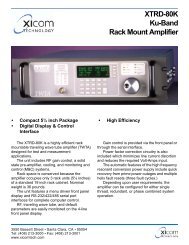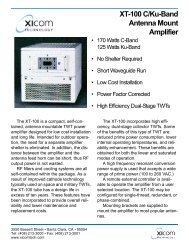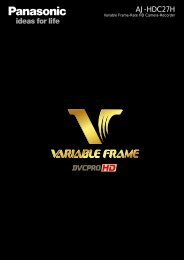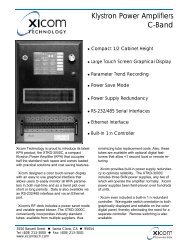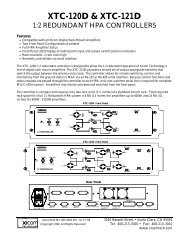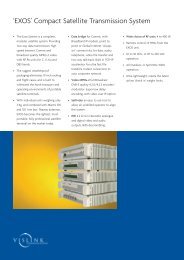Kroma Telecom, Manual TB6000 (0,51 MB)
Kroma Telecom, Manual TB6000 (0,51 MB)
Kroma Telecom, Manual TB6000 (0,51 MB)
Create successful ePaper yourself
Turn your PDF publications into a flip-book with our unique Google optimized e-Paper software.
INTERCOM 6000<br />
TM6008R01/TM6016R01/TM6032R01<br />
Service <strong>Manual</strong><br />
TM6000D21<br />
2002<br />
KROMA T E L E C O M<br />
Pol. Ind. Alcobendas - C/ La Granja, 80<br />
28108 Madrid - ESPAÑA<br />
Tel. (34-91) 661 45 14<br />
Fax. (34-91) 661 58 75<br />
e-mail: sales@kromatelecom.com<br />
www.kromatelecom.com
KROMA TELECOM INTERCOM 6000<br />
SAFETY INFORMATION<br />
WARNING: This product includes critical<br />
mechanical and electrical parts which are<br />
essential for X-Radiation safety.<br />
For continued safety replace critical components<br />
indicated in the service schematic only with exact<br />
replacement parts given in the parts list of<br />
service <strong>Manual</strong>.<br />
Operating high voltage for this product is 16 Kv.<br />
At minimum brightness. Refer to service manual<br />
for measurement procedures and proper service<br />
adjustments.<br />
WARNING: Electric shock or fire hazard can be<br />
caused if critical components are replaced by non<br />
conform components. Refer to parts list of service<br />
manual.<br />
CAUTION: High vacuum tube is dangerous to<br />
handle refer replacement to qualified personnel.<br />
Replace with a tube of the same type for continued<br />
safety.<br />
INTERCOM 6000<br />
1
KROMA TELECOM INTERCOM 6000<br />
PREFACE<br />
The User`s and Service <strong>Manual</strong> describes the KROMA Model <strong>TB6000</strong> Talback<br />
System. Information is divided into two basic parts:<br />
- User <strong>Manual</strong><br />
- Service <strong>Manual</strong><br />
The User`s <strong>Manual</strong>, encompassing section 1, 2, 3 and 4 is in its own volume with the<br />
intent that is may be self contained. It may also be combined to form an integral part of<br />
the Service <strong>Manual</strong>. The Service <strong>Manual</strong> starts with section 5.<br />
NOTE: KROMA RESERVES THE RIGHT TO INTRODUCE MODIFICATION<br />
FROM TIME TO TIME WITHOUT UPDATING THIS HANDBOOK.<br />
UM6000D04<br />
2
KROMA TELECOM INTERCOM 6000<br />
INDEX<br />
1. INTRODUCTION..............................................................................................................................4<br />
1.1. INTRODUCTION........................................................................................................................4<br />
1.2. FEATURES..................................................................................................................................4<br />
1.3. TECHNICAL SPECIFICATIONS...............................................................................................5<br />
1.3.1. Central Matrix, TM60XX......................................................................................................5<br />
1.3.2. Audio and Control Modules .................................................................................................5<br />
2. GENERAL DESCRIPTION..............................................................................................................6<br />
2.1. TM60XX MATRIX......................................................................................................................6<br />
2.1.1. Functional Description of the 8 x 8 Central Matrix.............................................................6<br />
2.1.2. Functional Description of the 16 x 16 Central Matrix.........................................................7<br />
2.1.3. Functional Description of the 32 x 32 Central Matrix.........................................................7<br />
2.2. TM60XX PERSONALITY CONFIGURATION.........................................................................7<br />
2.2.1. Map Configuration .............................................................................................................14<br />
2.3. CONTROL PANEL TP6008/TP6024 ........................................................................................15<br />
2.4. TERMINALS AP6000 AND CP6032 MODULES ....................................................................15<br />
2.4.1. General...............................................................................................................................15<br />
2.4.2. Funtional Description ........................................................................................................16<br />
2.5. 6 LINE/4 WIRE ADAPTOR, CE6000 .......................................................................................16<br />
2.6. BELTPACK, BP6000.................................................................................................................16<br />
2.7. EXTERNAL LINE PANEL EL6000..........................................................................................16<br />
2.8. TELEPHONE LINE PANEL HN6000.......................................................................................16<br />
3. INSTALLATION .............................................................................................................................17<br />
3.1. GENERAL .................................................................................................................................17<br />
3.2. UNPACKING ............................................................................................................................17<br />
3.3. POWER REQUIREMENTS ......................................................................................................17<br />
3.4. EQUIPMENT RACK MOUNTING...........................................................................................17<br />
3.5. TM6008 - CIRCUIT BOARD LOCATIONS .............................................................................17<br />
3.6. TM6016 - CIRCUIT BOARD LOCATIONS .............................................................................19<br />
3.7. TM6032 - CIRCUIT BOARD LOCATIONS .............................................................................20<br />
3.8. CP6032 CONTROL PANEL MODULE....................................................................................21<br />
3.9. AP6000 AUDIO PANEL MODULE..........................................................................................21<br />
3.10. TP6008/TP6024 INTEGRATED AUDIO&CONTROL PANEL MODULES ......................21<br />
3.11. EL6000 - EXTERNAL LINE MODULE ...............................................................................21<br />
3.12. HN6000 - EXTERNAL LINE MODULE...............................................................................22<br />
3.13. BELTPACK, BP6000.............................................................................................................23<br />
3.14. 6 LINE/4 WIRE ADAPTOR, CE6000....................................................................................23<br />
3.15. INPUT/OUTPUT INTERCONNECTIONS...........................................................................24<br />
4. OPERATION....................................................................................................................................27<br />
4.1. GENERAL .................................................................................................................................27<br />
4.2. MULTIPLE CALL .....................................................................................................................27<br />
4.2.1. Operational Example..........................................................................................................27<br />
4.3. EXTERNAL SIGNALS .............................................................................................................28<br />
4.3.1. EL6000 operation...............................................................................................................28<br />
4.3.2. HN6000 operation..............................................................................................................28<br />
4.4. KEY USE ...................................................................................................................................28<br />
UM6000D04<br />
3
KROMA TELECOM INTERCOM 6000<br />
1. INTRODUCTION<br />
1.1. INTRODUCTION<br />
The present Intercom System is the result of years of experience by KROMA in<br />
TV Broadcast and Teleproduction areas.<br />
KROMA TB-6000 Intercom System represents a significant improvement in<br />
Intercom Systems with considerable reduction in System size and installation<br />
complexity.<br />
Human engineering has been designed intro the TB-6000 along with state-ofthe-art<br />
components to provide maximum reliability and functionality.<br />
Four standard Matrix configurations are available and experence has shown that<br />
with these a flexible system such as the TB-6000 can meet the majority of<br />
customer requeriments. They are:<br />
TM6008, 8x8 Central Matrix<br />
TM6016, 16x16 Central Matrix<br />
TM6032, 32x32 Central Matrix<br />
Several comprehensive systems can be interconnected to build a<br />
communications network. A comprehensive system from very small to very<br />
large can be custom ordered. Our goal is to provide you, the customer, with the<br />
right product and accessories for your application.<br />
1.2. FEATURES<br />
* 4 wire operation.<br />
* Electronically balance input and outputs.<br />
* Speed plan and priorities easily reprogrammable with a PC.<br />
* Multiple audio control levels<br />
* Electronically latching or Hold - to - Talk keys.<br />
* LED status indication on switches.<br />
UM6000D04<br />
4
KROMA TELECOM INTERCOM 6000<br />
1.3. TECHNICAL SPECIFICATIONS<br />
1.3.1. Central Matrix, TM60XX<br />
Input<br />
Nominal level + 6 dBV<br />
Maximum level + 18 dBV<br />
Impedance >10 K ohms<br />
Common mode rejection > 65 dB<br />
Input/Output<br />
Gain 0 ± 1 dB<br />
Frequency Response 100 Hz to 10 Khz, ± 0.5 dB<br />
Distortion ≤ 0.1 %, 100 Hz to 10 Khz<br />
Output<br />
Impedance ≤ 150 ohms<br />
Signal / Noise Ratio > 65 dB<br />
Crosstalk < 65 dB<br />
External Interface<br />
RS-232C<br />
Power Requirements 110/220 VAC, ± 10 %<br />
50 / 60 Hz<br />
Power Consumption < 20 VA (TM-6008)<br />
< 30 VA (TM-6016)<br />
< 50 VA (TM-6032)<br />
1.3.2. Audio and Control Modules<br />
See the user manuals reference: UM6000D02, UM6000D03 and UM6000D04.<br />
Notice: All specifications subject to change without notice.<br />
UM6000D04<br />
5
KROMA TELECOM INTERCOM 6000<br />
2. GENERAL DESCRIPTION<br />
2.1. TM60XX MATRIX<br />
The <strong>TB6000</strong> series is based around central switching matrices. Three standard<br />
Matrix configurations are available: TM6008- 8 x 8 Central Matrix, TM6016-<br />
16 x 16, TM6032- 32 x 32 Central Matrix. Each Matrix contains a series of<br />
dedicated plug-in modules housed in rack frames. The system contains one<br />
microprocessor control card for each 8 x 8, and 16 x 16 Central Matrix. Two<br />
microprocessor control cards are required for each 32 x 32 Central Martrix.<br />
All matrix contain three basic board components which are: Crosspoint cards,<br />
Buffer Amplifier cards, and the Microprocessor Control card. The Buffer<br />
amplifier cards adapt the impedance of the input lines to the crosspoints. The<br />
switcher modules achieve routing by solid state crosspoints. The microprocessor<br />
board controls the Input/Output crosspoints. The 8 x 8, 16 x 16, and 32 x 32<br />
matrices contain their own power supply.<br />
The system has been designed from its inception to provide total flexibility to<br />
configure a system to the specific requirements of a customer. Therefore, it will<br />
be necessary for each customer to fill out a system configuration form. This will<br />
provide KROMA with complete information of the interconnections required.<br />
KROMA will then supply EPROMS for the required system.<br />
2.1.1. Functional Description of the 8 x 8 Central Matrix<br />
The TM6008 is contained in a 1RU high rack frame, 19” wide containing:<br />
* Power Supply. This plug in unit supplies the necessary voltages for only one 8<br />
x 8 matrix.<br />
* Buffer Amplifier Card.(Internal Card). Each 8 x 8 matrix contains one Buffer<br />
Card with 8 Input/Output Lines.<br />
* Crosspoint cards (Switcher Cards). Each 8 x 8 matrix contains one crosspoint<br />
cards. Each card consists of eight basic 8 x 1 switching matrices and eight<br />
output stages to make the signals symmetrical before sending to the output<br />
pairs.<br />
* Microprocessor Control card- controls crosspoints, and associated areas.<br />
* Self-contain power suply.<br />
UM6000D04<br />
6
KROMA TELECOM INTERCOM 6000<br />
2.1.2. Functional Description of the 16 x 16 Central Matrix<br />
The TM6016 is contained in a 1RU high rack frame 19” wide containing:<br />
* Power Supply. This plug in unit supplies the necessary voltages for only one<br />
16 x 16 matrix.<br />
* Buffer Amplifier Card.(Internal Card). Each 16 x 16 matrix contains one<br />
Buffer Card with 16 Input/Output Lines.<br />
* Crosspoint cards (Switcher Cards). Each 16 x 16 matrix contains one<br />
crosspoint cards. Each card consists of sixteen basic 16 x 1 switching<br />
matrices and sisteen output stages to make the signals symmetrical before<br />
sending to the output pairs.<br />
* Microprocessor Control card- controls crosspoints, and associated areas.<br />
* Self-contain power suply.<br />
2.1.3. Functional Description of the 32 x 32 Central Matrix<br />
The description for the TM6032 is basically the same as the TM016 with the<br />
following exceptions:<br />
The TM6032 is contained in a 2R4 high rack frame 19” wide containing:<br />
4 Crosspoint Cards<br />
2 Buffer Amplifier Cards (Internal Card)<br />
2 Microprocessor Cards<br />
1 Self-contained Power Supply<br />
2.2. TM60XX PERSONALITY CONFIGURATION<br />
In order to configure the TM60xx it will be necessary for the customer to<br />
complete the following forms depending upon which configuration is required.<br />
Form A1, and A5 are required for the TM6008 configuration and are shown<br />
in figures 1 and 2<br />
Form A2, and A6 are required for the TM6016 configuration and are shown<br />
in figures 3 and 4<br />
Form A3 and A7 are required for the TM6032 configuration and are shown<br />
in figures 5 and 6<br />
UM6000D04<br />
7
KROMA TELECOM INTERCOM 6000<br />
- Figure 1: Form A1<br />
UM6000D04<br />
8
KROMA TELECOM INTERCOM 6000<br />
- Figure 2: Form A5<br />
UM6000D04<br />
9
KROMA TELECOM INTERCOM 6000<br />
- Figure 3: Form A3<br />
UM6000D04<br />
10
KROMA TELECOM INTERCOM 6000<br />
- Figure 4: Form A6<br />
UM6000D04<br />
11
KROMA TELECOM INTERCOM 6000<br />
- Figure 5: Form A3<br />
UM6000D04<br />
12
KROMA TELECOM INTERCOM 6000<br />
- Figure 6: Form A7<br />
UM6000D04<br />
13
KROMA TELECOM INTERCOM 6000<br />
2.2.1. Map Configuration<br />
The following information must be filled in on the printed System Configuration<br />
forms required for your particular system.<br />
A. NU<strong>MB</strong>ER/TYPE- Fill in to numbers/characters to define size/type of<br />
outstation<br />
B. TALLY CTRL- Fill in yes/no (Y/N) if the outstation is fed with Tally<br />
signal.<br />
If yes, A5, A6 and A7 forms must be filled out per every outstation with<br />
Tally signal, according to the size of the matrix.<br />
C. EXT- Fill in yes/no (Y/N) if the outstation is supplied with an External<br />
Line Module EL6000.<br />
D. 2nd MX. ACC.- Fill in yes/no (Y/N) if the terminal is fed with a<br />
EO6000 Second Matrix Access option card.<br />
E. SOURCE- Fill in the input source for every input number. A maximun<br />
of 8 characters can be used.<br />
F. CROSSPOINTS- For every input with an associated terminal, the type<br />
of crosspoints along with the outoputs must be indicated at the<br />
intersection of the input/output as follows:<br />
X NORMAL (TALK): Unidirectional routing from source to selected<br />
destination.<br />
2 WAY (TALK & LISTEN): Bidirectional routing allowing 2 way<br />
communication between source and selected destination.<br />
• FIXED: Permanent unidirectional routing from source to destination.<br />
STAND-BY: Permanent unidirectional routing from source to<br />
destination with the ability to temporarily override this with another<br />
routing selected by an authorised source.<br />
▲ REMOTE (TALK): Unidirectional routing from source to destination<br />
selected from a third outstation.<br />
✳ REMOTE (TALK & LISTEN): Bidirectional routing allowing 2-way<br />
communication between the source and destination, selected from a third<br />
outstation.<br />
▼ LISTEN: Unidirectional routing selected from a destination.<br />
UM6000D04<br />
14
KROMA TELECOM INTERCOM 6000<br />
G. SPECIAL FUNCTION<br />
TALLY: There are 16 different levels for the control of crosspoints from<br />
a tally signal which is applied to individual outstations.<br />
DIRECT CONTROL: An interface units allows the matrix to be<br />
controlled by contact closures, external to the intercom system.<br />
Conversely, it allows an outstation to control external devices via relay<br />
contacts. Up to 64 inputs and outputs can be accomodated in blocks of 16<br />
within a 1 UR 19” frame.<br />
NOTE :<br />
Terminals, belt-packs, cameras, etc. are simultaneously inputs and<br />
outputs. Therefore, the same reference has to be used in the input and<br />
output calls in normal situations, although in special cases they could be<br />
different.<br />
2.3. CONTROL PANEL TP6008/TP6024<br />
See the User <strong>Manual</strong>s UM6000D04 for more information about this control<br />
panels.<br />
2.4. TERMINALS AP6000 AND CP6032 MODULES<br />
2.4.1. General<br />
Terminal Station requires 2 RU`s height of space in a standard half rack width<br />
panel. It contains its own microprocessor (s). One cable pair carries the data and<br />
control signals. There is one standard type: the CP6032 (32 keys).<br />
The terminals contain software design to generate special unique features such<br />
as momentary latching switch action, present memories, etc.<br />
Each button on the keyboard contains a green LED. It is activated when a<br />
preselection is generated or when these keys enable the audio signal to be sent or<br />
received.<br />
See the User <strong>Manual</strong>s UM6000D02 and UM6000D03 for more information<br />
about this control panels.<br />
UM6000D04<br />
15
KROMA TELECOM INTERCOM 6000<br />
2.4.2. Funtional Description<br />
Each unit consists of the following:<br />
• Analogue Circuit- Provides clear commnication with full range frequency<br />
response and 2.5 watts RMS of distortionless audio via send and return from<br />
the matrix. The included microphone with AGC keeps the voice at a<br />
suitable level.<br />
• Power Supply- Self contained unit supplies necessary voltages.<br />
• Keyboard Circuit- Attached to the front panel is the keypad wich may<br />
contain 32 keys. Also, included on the front panel is the selected multiple<br />
call selector and call adder.<br />
• Microprocessor Circuit- Provides local control along with Matrix access.<br />
2.5. 6 LINE/4 WIRE ADAPTOR, CE6000<br />
This unit is designed to provide the best possible coupling between the Beltpack<br />
or other 4 wire equipment and the KROMA Intercom System. Up to six<br />
Beltpacks can be handled by this adaptor.<br />
The incoming and outgoing signals in the CE6000 are symmetrical.<br />
The CE6000 voltage is supplied from the matrix or external line module and<br />
also provides power to the beltpack.<br />
2.6. BELTPACK, BP6000<br />
The communication from or to the beltpacks is passed to the Matrix or External<br />
Line Module thus allowing each beltpack in the system to talk with every station<br />
or single communication with only one.<br />
The headphone volume may be independently adjusted. The beltpack has been<br />
built to stand abuse.<br />
Each beltpack can be connected to the matrix via a terminal connector or via the<br />
CE6000 or to an External Line Module.<br />
2.7. EXTERNAL LINE PANEL EL6000<br />
This panel provides facilities for two dedicated external inputs/outputs (e.g.<br />
lines, Belt-Packs, Radio Links, etc.) with mute, volume and external controls.<br />
2.8. TELEPHONE LINE PANEL HN6000<br />
UM6000D04<br />
16
KROMA TELECOM INTERCOM 6000<br />
This panel provides facilities for one dedicated external telephone line with line<br />
access, volume and external controls.<br />
3. INSTALLATION<br />
3.1. GENERAL<br />
The steps necessary to assemble and install the talkback system are as follows:<br />
Unpacking and Inspection<br />
Card frame mounting and loading<br />
Input/Output Connections<br />
3.2. UNPACKING<br />
Each Talkback System is tested, inspected and found free of defects prior to<br />
shipment. Carefully inspect all equipment for damage.<br />
Most of the equipment will be packed in its own individual box. Do not destroy<br />
packing materials and boxes until all equipment is installed and functioning<br />
properly.<br />
3.3. POWER REQUIREMENTS<br />
The A.C. mains of the Talkback System is wired as ordered for either 110, 220<br />
VAC ± 10 % 50/60 Hz.<br />
3.4. EQUIPMENT RACK MOUNTING<br />
With the exception of the Beltpack and the Adaptor, the Matrix will be mounted<br />
in the standard 19 inch rack equipment cabinets.<br />
Terminals can be rack mounted with a 19” Rack Mount Adaptor Kit for<br />
mounting half width units such as the CP6032, AP6000 etc.<br />
3.5. TM6008 - CIRCUIT BOARD LOCATIONS<br />
Figure 7 shows the locations of the PC cards, with its corresponding power<br />
supply, within the 8 x 8 Central Matrix.<br />
Figure 8 shows the rear panel location of the various interconnections.<br />
UM6000D04<br />
17
KROMA TELECOM INTERCOM 6000<br />
Figure 7: TM6008 front.<br />
POWER<br />
MICROPROCESSOR CARD<br />
O<br />
CROSSPOINT CARD<br />
POWER SUPPLY<br />
+5 +V -V I<br />
Figure 8: TM6008 rear.<br />
RS 232<br />
6<br />
4<br />
2<br />
°<br />
7<br />
5<br />
3<br />
1<br />
.<br />
.<br />
. . . .<br />
AC MAINS .<br />
. .<br />
UM6000D04<br />
18
KROMA TELECOM INTERCOM 6000<br />
3.6. TM6016 - CIRCUIT BOARD LOCATIONS<br />
Figure 9 shows the locations of the PC cards, with its corresponding power<br />
supply within the 16 x 16 Central Matrix.<br />
Shown in figure 10 is the rear panel interconnection layout of the 16 x 16<br />
Central Matrix.<br />
Figure 9: TM6016 front.<br />
POWER<br />
MICROPROCESSOR CARD<br />
CROSSPOINT CARD<br />
POWER SUPPLY<br />
O<br />
+5 +V -V I<br />
Figure 10: TM6016 rear.<br />
RS 232<br />
14<br />
12<br />
10<br />
8<br />
6<br />
4<br />
2<br />
°<br />
15<br />
13<br />
11<br />
9<br />
7<br />
5<br />
3<br />
1<br />
AC MAINS<br />
UM6000D04<br />
19
KROMA TELECOM INTERCOM 6000<br />
3.7. TM6032 - CIRCUIT BOARD LOCATIONS<br />
The 32 x 32 Central Matrix is mounted in a 2 RU high frame as is shown in<br />
figure 11 . The frame contains 2 Buffer Amplifier Cards, 4 Crosspoint Cards, 2<br />
Microprocessor Cards and the Power Supply Module.<br />
Shown in figure 12 are the rear panel I/O connectors, RS-232C connector,<br />
ground system, Mains fuse and AC Mains input-socket.<br />
Also shows the input/output designations on the connector.<br />
Figure 11: TM6032 front.<br />
POWER<br />
MICROPROCESSOR CARD<br />
.<br />
.<br />
CROSSPOINT CARD (1)<br />
CROSSPOINT CARD (2)<br />
CROSSPOINT CARD (4)<br />
.<br />
.<br />
.<br />
. +5 +V -V<br />
.<br />
.<br />
.<br />
.<br />
.<br />
.<br />
.<br />
..<br />
.<br />
.<br />
.<br />
.<br />
. .<br />
. .<br />
.<br />
Figure 12: TM6032 rear.<br />
14<br />
12<br />
10<br />
8<br />
6<br />
.<br />
4<br />
.<br />
.<br />
.<br />
2<br />
.<br />
.<br />
°<br />
.<br />
.<br />
15<br />
13<br />
11<br />
9<br />
7<br />
5<br />
3<br />
1<br />
RS 232<br />
30<br />
28<br />
26<br />
24<br />
22<br />
20<br />
18<br />
16<br />
31<br />
29<br />
27<br />
25<br />
23<br />
21<br />
19<br />
17<br />
AC MAINS<br />
WARNING: FOR CONTINUED<br />
PROTECTION AGAINS FIRE HAZARD<br />
REPLACE ONLY WITH THE SAME<br />
TYPE AND RATING OF FUSE.<br />
UM6000D04<br />
20
KROMA TELECOM INTERCOM 6000<br />
3.8. CP6032 CONTROL PANEL MODULE<br />
See the User <strong>Manual</strong>s UM6000D03 for more information about this control<br />
panels.<br />
3.9. AP6000 AUDIO PANEL MODULE<br />
See the User <strong>Manual</strong>s UM6000D02 for more information about this audio<br />
panels.<br />
3.10. TP6008/TP6024 INTEGRATED AUDIO&CONTROL PANEL<br />
MODULES<br />
See the User <strong>Manual</strong>s UM6000D04 for more information about this integrated<br />
panels.<br />
3.11. EL6000 - EXTERNAL LINE MODULE<br />
Figure 13 shows the front panel of the EL6000 with the physical locations of all<br />
controls.<br />
Figure 14 shows the rear panel with the locations of the link connectors and<br />
external line connectors.<br />
Figure 13: EL6000 front.<br />
EXT. 1<br />
EXT. 2<br />
VOL. IN OUT VOL.<br />
IN OUT<br />
Figure 14: EL6000 rear.<br />
WARNING: FOR CONTINUED PROTECTION<br />
AGAINST FIRE HAZARD REPLACE ONLY WITH<br />
THE SAME TYPE AND RATING OF FUSE.<br />
VOLT. RANGE<br />
.<br />
110 VAC<br />
.<br />
220 VAC<br />
FUSE DATA<br />
0.5A SLOW<br />
0.2A SLOW<br />
MATRIX EXT. 2 EXT. 1<br />
UM6000D04<br />
21
KROMA TELECOM INTERCOM 6000<br />
3.12. HN6000 - EXTERNAL LINE MODULE<br />
Figure 15 shows the front panel of the HN6000 with the physical locations of all<br />
controls.<br />
Figure 16 shows the rear panel with the locations of the link connectors and<br />
external line connectors.<br />
Figure 15: HN6000 front.<br />
LINE<br />
VOL. IN OUT<br />
LINE<br />
ON/OFF<br />
Figure 16: HN6000 rear.<br />
WARNING: FOR CONTINUED PROTECTION<br />
AGAINST FIRE HAZARD REPLACE ONLY WITH<br />
THE SAME TYPE AND RATING OF FUSE.<br />
MATRIX<br />
VOLT. RANGE<br />
110VAC<br />
220VAC<br />
FUSE DATA<br />
0.5A SLOW<br />
0.2A SLOW<br />
LINE<br />
UM6000D04<br />
22
KROMA TELECOM INTERCOM 6000<br />
3.13. BELTPACK, BP6000<br />
Figure 17 shows the rugged beltpack unit. This unit has been designed for<br />
continuous use. It is compact and versatile. Practical operating features include a<br />
volume control, headset jack, microphone mute and connector to CE6000<br />
adaptor or TM60XX Matrix.<br />
Figure 17: BP6000.<br />
Figure 18: CE6000<br />
MX.<br />
I/06<br />
I/01<br />
I/05<br />
I/02<br />
I/04<br />
I/03<br />
ON<br />
MICRO<br />
3.14. 6 LINE/4 WIRE ADAPTOR, CE6000<br />
The 6 Line/4 wires adaptor is shown in figure 18. The adaptor can handle six<br />
beltpacks. The output from the adaptor is then sent to the Matrix, or EXT Lines.<br />
UM6000D04<br />
23
KROMA TELECOM INTERCOM 6000<br />
3.15. INPUT/OUTPUT INTERCONNECTIONS<br />
Figure 19 :Shows the interconnection for use between the TM60XX and<br />
BP6000.<br />
CONT. MATRIX SUBD 9 MALE PIN TO PIN CONT. DIN 7 270 FEMALE<br />
1 DATA LINK - 1 AUDIO OUT TO MATRIX +<br />
2 DATA LINK + 2 ANALOG GROUND<br />
3 GROUND 3-2 3 AUDIO IN FROM MATRIX +<br />
4 AUDIO IN FROM TERM. - 4-4 4 AUDIO OUT TO MATRIX -<br />
5 AUDIO IN FROM TERM + 5-1 5 AUDIO IN FROM MATRIX -<br />
6 +V 6-7 6 -V<br />
7 AUDIO OUT TO TERM. - 7-5 7 +V<br />
8 AUDIO OUT TO TERM + 8-3<br />
9 -V 9-6<br />
Cable reference: 7x0.11 max. length 50 mts.<br />
Figure 20 :Shows the interconnection for use between the CE6000 or EL6000<br />
and BP6000 .<br />
CONT. SUBD 15 MALE PIN TO PIN CONT. DIN 7 270 FEMALE<br />
1 AUDIO IN FROM TERM + 1-1 1 AUDIO OUT TO MATRIX +<br />
3,4 GROUND 3,4-2 2 ANALOG GROUND<br />
12 AUDIO OUT TO TERM + 12-3 3 AUDIO IN FROM MATRIX +<br />
2 AUDIO IN FROM TERM. - 2-4 4 AUDIO OUT TO MATRIX -<br />
11 AUDIO OUT TO TERM. - 11-5 5 AUDIO IN FROM MATRIX -<br />
6 -V 6-6 6 -V<br />
5 +V 5-7 7 +V<br />
Cable reference: 7x0.11 max. length 50 mts.<br />
Figure 21 :Shows the interconnection for use between the TM60XX and<br />
AP6000/CP6032/TP6008/TP6008.<br />
CONT. MATRIX SUBD 9 MALE PIN TO PIN GROUP CONT. TERMINAL SUBD 9 FEMALE<br />
1 DATA LINK - 1-1 A 1 DATA LINK -<br />
2 DATA LINK + 2-2 A 2 DATA LINK +<br />
3 GROUND 3-3 A 3 ANALOG GROUND<br />
4 AUDIO IN FROM TERM. - 4-4 B 4 AUDIO OUT TO MATRIX -<br />
5 AUDIO IN FROM TERM + 5-5 B 5 AUDIO OUT TO MATRIX +<br />
6 +V 3-6 B 6 DIGITAL GROUND<br />
7 AUDIO OUT TO TERM. - 7-7 C 7 AUDIO IN FROM MATRIX -<br />
8 AUDIO OUT TO TERM + 8-8 C 8 AUDIO IN FROM MATRIX +<br />
9 -V 3-9 C 9 ANALOG GROUND<br />
Cable reference: COMELDAT TP (D) V 3x2x0.38<br />
UM6000D04<br />
24
KROMA TELECOM INTERCOM 6000<br />
Figure 22: Shows the interconnection for use between the TM60XX and<br />
EL6000/HN6000.<br />
CONT. MATRIX SUBD 9 MALE PIN TO PIN GROUP CONT. TERMINAL SUBD 9 FEMALE<br />
1 DATA LINK - 1-1 A 1 DATA LINK -<br />
2 DATA LINK + 2-2 A 2 DATA LINK +<br />
3 GROUND 3-3 A 3 ANALOG GROUND<br />
4 AUDIO IN FROM TERM. - 4-4 B 4 AUDIO OUT TO MATRIX -<br />
5 AUDIO IN FROM TERM + 5-5 B 5 AUDIO OUT TO MATRIX +<br />
6 +V 3-6 B 6 DIGITAL GROUND<br />
7 AUDIO OUT TO TERM. - 7-7 C 7 AUDIO IN FROM MATRIX -<br />
8 AUDIO OUT TO TERM + 8-8 C 8 AUDIO IN FROM MATRIX +<br />
9 -V 3-9 C 9 ANALOG GROUND<br />
Cable reference: COMELDAT TP (D) V 3x2x0.38<br />
Figure 23: Shows the interconnection for use between the TM60XX and the<br />
CE6000.<br />
CONT. MATRIX SUBD 9 MALE PIN TO PIN GROUP CONT. CE 6000 SUBD 15 FEMALE<br />
4 AUDIO IN FROM CE6000 - 4-2 A 1 AUDIO OUT TO MATRIX +<br />
5 AUDIO IN FROM CE6000 + 5-1 A 3,4 GROUND<br />
3 GROUND 3-3,4 12 AUDIO IN FROM MATRIX +<br />
7 AUDIO OUT TO CE6000 - 7-11 B 2 AUDIO OUT TO MATRIX. -<br />
8 AUDIO OUT TO CE6000 + 8-12 B 11 AUDIO IN FROM MATRIX. -<br />
6 +V 6-5 C 6 -V<br />
9 -V 9-6 C 5 +V<br />
Cable reference: COMELDAT TP (D) V 3x2x0.38<br />
Figure 24 :Shows the link required to interconnect AP6000 modules with<br />
CP6032.<br />
CONT. AP6000 SUBD 25 FEMALE PIN TO PIN CONT. CP6032 SUBD 25 MALE<br />
1 DATA + 1-1 1 DATA +<br />
14 DATA - 14-14 14 DATA -<br />
6 GROUND 6-6 6 GROUND<br />
UM6000D04<br />
25
KROMA TELECOM INTERCOM 6000<br />
Figure 25 :Shows the link required to interconnect AP6000 modules with<br />
CP6032 with EO6000 option.<br />
CONT. AP6000 SUBD 25 FEMALE PIN TO PIN CONT. CP6000 SUBD 25 MALE<br />
1 DATA + 1-1 1 DATA +<br />
14 DATA - 14-14 14 DATA -<br />
6 GROUND 6-6 6 GROUND<br />
CONT. CP6032 SUBD 25 MALE PIN TO PIN CONT. AP6000 SUBD 9 FEMALE<br />
15 AUDIO IN - 15-4 4 AUDIO OUT -<br />
17 AUDIO IN + 17-5 5 AUDIO OUT +<br />
21 AUDIO OUT + 21-8 8 AUDIO IN +<br />
25 AUDIO OUT - 25-7 7 AUDIO IN -<br />
3 GROUND 3-9 9 GROUND<br />
Figure 26 :Shows the link required to interconnect TM60XX with the PC for the<br />
map configuration software.<br />
CONT. TM60XX SUBD 9 FEMALE PIN TO PIN CONT. PC SUBD 9 FEMALE<br />
2 RX 2-2 2 TX<br />
3 TX 3-3 3 RX<br />
5 GROUND 5-5 5 GROUND<br />
Figure 27 :Shows the link required to interconnect EL6000 and a external audio<br />
source.<br />
CONT. EL6000 SUBD 15 MALE GROUP<br />
1 AUDIO IN TO EL6000 + A<br />
3,4 GROUND A,B,C<br />
2 AUDIO IN TO EL6000. - A<br />
11 AUDIO OUT FROM EL6000 + B<br />
12 AUDIO OUT FROM EL6000 - B<br />
6 -V C<br />
5 +V C<br />
UM6000D04<br />
26
KROMA TELECOM INTERCOM 6000<br />
4. OPERATION<br />
4.1. GENERAL<br />
There is one standard module, the CP6032 which contains 32 Keypad buttons.<br />
4.2. MULTIPLE CALL<br />
Multiple calls can be made from outstations in the <strong>TB6000</strong> system using the Σ<br />
and SΣ Keys in conjunction with the required destination keys. This multiple<br />
call configuration is held in the outstation memory for immediate use.<br />
4.2.1. Operational Example<br />
a. To initiate a Multiple call press the SΣ key. The yellow LED will be<br />
illuminated continuously.<br />
b. Select the desired destination keys. The green LED will be illuminated in<br />
all keys selected.<br />
c. Press the SΣ key when the selection has been completed.<br />
d. Pressing Σ will illuminate a green LED continuously in all keys selected.<br />
The communication will then be allowed.<br />
e. To terminate a call depress Σ. The green LED illuminated will go to its<br />
off state.<br />
In this way the multi call information will not be lost or affected by other<br />
individual calls.<br />
f. To cancel this information, press SΣ, and then depress each individual<br />
illuminated green key. Once again, depress Σ.<br />
UM6000D04<br />
27
KROMA TELECOM INTERCOM 6000<br />
4.3. EXTERNAL SIGNALS<br />
4.3.1. EL6000 operation<br />
a. Two dedicated external Input/Output lines (EXT 1 and EXT 2) can be fed to<br />
the External Line module EL6000 for use with wireless interfaces, telephone<br />
lines, etc.<br />
b. Located on the front panel are two keys labeled OUT. Depressing either one<br />
of these two keys will send the associated external output signal.<br />
c. Also, located on the front panel are the IN keys. When these keys are<br />
depressed the asociated audio input will be attenuated.<br />
d. The audio input level is controlled by the volume control on the front panel.<br />
4.3.2. HN6000 operation<br />
a. One dedicated external telephone Input/Output line (LINE) can be fed to the<br />
Telephone Line.<br />
b. Located on the front panel there is a key labeled OUT. Depressing one of this<br />
key will send the associated output signal.<br />
c. Also, located on the front panel there is the IN key. When this key is<br />
depressed the asociated audio input will be attenuated.<br />
d. The access to the telephone line is controled by the LINE ON/OFF key.<br />
e. The audio input level is controlled by the volume control on the front panel.<br />
4.4. KEY USE<br />
Key function in one of two ways.<br />
a. SIMPLE LOCK - Depress and release to talk. Depress once again to<br />
break the circuit.<br />
b. PUSH-TO-TALK - Depress and maintain until communication has been<br />
completed. Time duration is a minimum of one second.<br />
This function in not available in all the type of terminals.<br />
UM6000D04<br />
28


